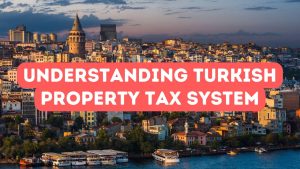Navigating the Turkish property tax system can often seem daunting for prospective property buyers and investors, especially for those unfamiliar with the local laws and regulations. At Bosphorus Brokers, we understand the significance of seamless transactions and informed decision-making in real estate investments. Our extensive experience in the Turkish real estate market equips us with the knowledge to guide our clients through every aspect of property ownership, including the intricate nuances of the tax system. From acquiring a comprehensive understanding of the various taxes applicable to property transactions to ensuring compliance with local tax regulations, we are dedicated to helping you maximize your investment potential while maintaining legal integrity. In this blog post, we will demystify the Turkish property tax system, providing you with essential insights to make well-informed decisions in your real estate endeavors.
Key Tax Obligations for Foreign Property Buyers in Turkey
When purchasing property in Turkey, foreign buyers must be aware of several key tax obligations to ensure smooth transactions and compliance with local regulations. One significant tax is the Property Acquisition Tax, which typically amounts to 4% of the property’s declared value and is usually shared equally between the buyer and seller. This tax must be paid before the transfer of the property title can be completed. Additionally, foreign buyers are subject to the annual Property Tax, which ranges between 0.1% to 0.6% of the property’s assessed value depending on its location. Understanding these obligations is crucial for avoiding any legal complications and ensuring a hassle-free investment experience in the Turkish real estate market.
Another critical tax consideration for foreign property buyers in Turkey is the Rental Income Tax, applicable if you plan to earn income by renting out your property. This tax is progressive, with rates ranging from 15% to 40% on your net rental income after allowable deductions. To comply with this obligation, it is essential to maintain precise and thorough records of all rental income and expenses, which can then be claimed as deductions to lower your taxable income. Furthermore, taxpayers must file an annual tax return, typically due by the end of March each year, detailing their rental earnings. Understanding and adhering to these rental income tax regulations will help you manage your investment effectively while staying within legal bounds.
Lastly, foreign property buyers should be mindful of the Capital Gains Tax, which applies if you decide to sell your property at a profit. The tax is levied on the difference between the property’s purchase price and its sale price, provided the holding period is less than five years. If the property is held for more than five years, the seller is exempt from this tax. The rates range from 15% to 35%, based on the amount of the capital gain. Proper planning and timing of property sales can significantly impact the tax liability, and consulting with tax professionals can provide strategic insights. Knowing these factors will ensure that you are well-prepared to handle the financial implications of selling your Turkish property.
Navigating Annual Property Tax Payments
Navigating the annual property tax payments in Turkey involves understanding the various components and timelines associated with these obligations. Property owners are required to pay an annual property tax, which is calculated based on the value of the property and the municipality in which it is located. Typically, this tax is paid in two installments, with the first installment due at the end of May and the second due at the end of November. It’s essential to stay informed about the current rates and deadlines, as late payments can incur penalties. At Bosphorus Brokers, we ensure our clients are well-versed with these timelines and provide reminders to help them meet their responsibilities punctually, thus avoiding any financial setbacks.
The calculation of the annual property tax is influenced by several factors, including the location, size, and type of the property. Urban properties typically have higher tax rates compared to rural properties, and different municipalities may impose varying rates within their jurisdictions. The base value for the tax calculation is determined by the local government, and it’s periodically updated to reflect changes in the market value of properties. Understanding these variables is crucial for accurate tax planning and budgeting. Bosphorus Brokers assists clients by providing detailed assessments of their tax liabilities, ensuring they are fully prepared for any financial commitments associated with property ownership in Turkey. Our goal is to ensure that our clients not only comply with local regulations but also manage their tax obligations efficiently, thereby optimizing their overall investment strategy.
It’s important to note that certain exemptions and discounts may apply, offering potential relief for specific groups such as disabled individuals, war veterans, and pensioners. First-time property buyers may also benefit from reductions in their tax liabilities, depending on the prevailing regulations at the time of purchase. At Bosphorus Brokers, we stay up-to-date with the latest legislative changes to ensure our clients take advantage of any available tax benefits. By providing tailored advice and expert guidance, we help you navigate the complexities of the Turkish property tax system with confidence, allowing you to focus more on enjoying your investment and less on the administrative burden. Working with us means having a dedicated partner committed to your financial well-being and long-term success in Turkey’s dynamic real estate market.
Tax Exemptions and Benefits for Investors in Turkish Real Estate
Investing in Turkish real estate comes with a plethora of tax exemptions and benefits, which can significantly enhance the attractiveness of this market for both domestic and foreign buyers. One notable advantage is the temporary VAT (Value Added Tax) exemption on properties purchased by foreign nationals and non-resident Turkish citizens, provided the payment for the property is made in foreign currency and the ownership is retained for at least one year. Additionally, income derived from the rental of residential properties may be eligible for certain deductions, reducing the overall tax liability for investors. These incentives not only bolster the appeal of the Turkish real estate market but also offer substantial financial advantages, making it a lucrative option for smart investors looking to expand their portfolio.
Furthermore, Turkey offers a “Wealth Amnesty” program allowing investors to bring undeclared assets into the country, including real estate, without incurring penalties or taxes. This initiative aims to stimulate the national economy by encouraging the repatriation of funds and investments, making it a favorable option for investors with global portfolios. Additionally, Turkey has signed double taxation treaties with numerous countries, ensuring that tax paid in Turkey can often be credited against tax liabilities elsewhere. These agreements help prevent double taxation and provide peace of mind for international investors, enhancing the appeal of Turkish real estate in a globally diverse investment strategy.
Additionally, the Turkish government offers various incentives aimed at fostering real estate investments and stimulating economic growth. For instance, investors who commit to holding their property for a minimum of three years may be eligible for a reduction in Capital Gains Tax (CGT). This long-term investment strategy not only provides tax relief but also contributes to a stable real estate market. Moreover, Turkey’s investment environment is underpinned by efforts to simplify tax procedures and enhance transparency, making it easier for investors to navigate the tax landscape. These benefits, coupled with Turkey’s strategic location and vibrant real estate market, underscore the potential for high returns and long-term growth, solidifying its status as a prime destination for property investors worldwide.







